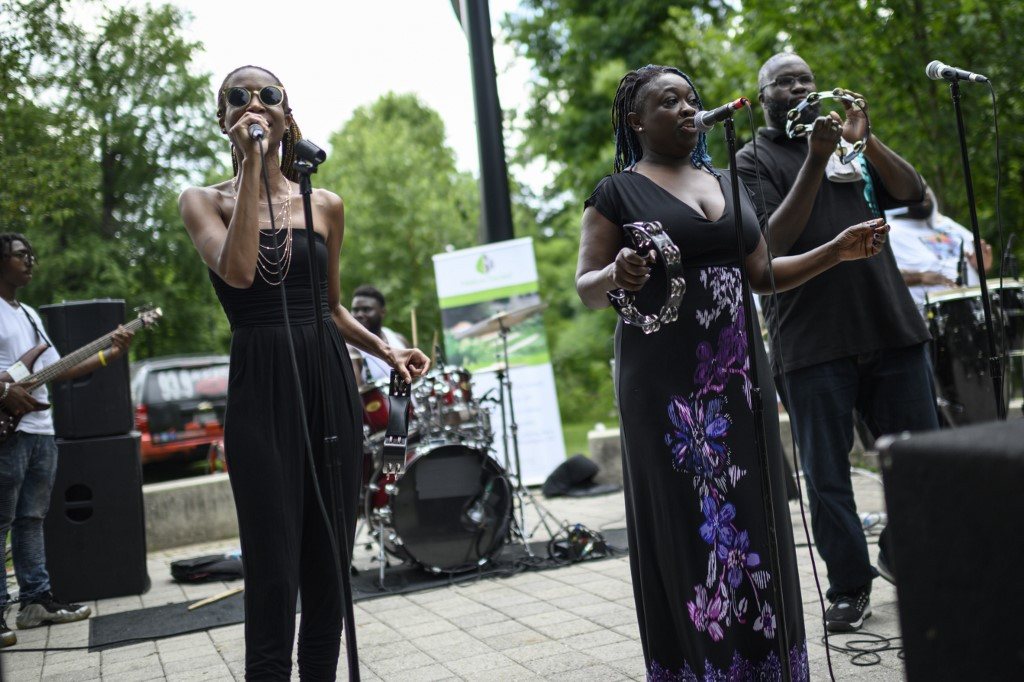Popular Reads
Top Results
Can't find what you're looking for?
View all search resultsPopular Reads
Top Results
Can't find what you're looking for?
View all search resultsStop, stop: Washington residents use go-go music to fight gentrification
Change text size
Gift Premium Articles
to Anyone
G
o-go music has been the rhythm of Washington for decades, but in recent weeks it has also become the improbable battle hymn of a movement pushing back against the capital city's rapidly expanding gentrification.
Guided by the music blasting out of a storefront speaker in Washington's Shaw neighborhood, a young woman with long braids instinctively marks out a few dance moves on the sidewalk while waiting to cross the street.
It's an impromptu dance break at the intersection of two worlds: close to U Street -- the "Black Broadway" of Washington, with its jazz clubs, chili dogs and traces of segregation -- and a nearby burgeoning haven for hipster craft beer bars, electric scooters and condominium apartment buildings like The Shay.
"Modern. Vibrant", promises a massive poster draped down the side of the luxury apartment complex. Below the sign, at ground level, the community's opinion becomes clear: "Gentrification is genocide", reads someone's graffiti.
Just a few weeks ago, after much insistence, a resident at The Shay got the owner of phone store across the street from the apartment building to turn off the go-go music that has played from the store's speakers every day for nearly a quarter of a century.
"The customers were complaining. Everybody kept running at the store asking why my music wasn't on," said owner Donald Campbell. He sits at the counter of his Metro PCS store, surrounded by go-go CDs that he sells at $10 each, in addition to phone equipment.
"They thought we were closed."
Over the next month, the store's silence rang loudly in the neighborhood. Residents organized petitions and impromptu street concerts, spreading the word on social media via the hashtag #DontMuteDC (referring to the District of Columbia, where Washington is located).
They finally succeeded in convincing John Legere, the CEO of T-Mobile -- of which Metro PCS is a subsidiary -- who took to Twitter to end the controversy.
"I've looked into this issue myself and the music should NOT stop in DC!" he wrote.
Campbell has since turned the music back on, albeit a little quieter now. But the fight for go-go continues.
"You can't go to Nashville, Tennessee and say, 'Stop playing country music.' You can't go to New Orleans and say, 'Stop playing jazz,'" said the former nightclub owner, his jeweled cross glinting around his neck.
"Everybody's voice has to be heard."
Read also: Why are cities so unaffordable? A crowdfunded film finds out
Chocolate City
Born in the 1960's and popularized over the following decade by Chuck Brown, the "Godfather of Go-Go", the music borrows from multiple genres -- funk, rhythm and blues, soul -- and is mainly heard live in concert, with an emphasis on audience call and response.
"Go-go means that the music keeps going. It doesn't stop. It's continuous," explains former go-go musician Peter Battle, who sports a t-shirt that reads "District of Cannabis", a substance that has been decriminalized in Washington.
The former trumpet player, now 55, has come to Campbell's store to buy a Chuck Brown CD. He remembers the times during the 1980s when he would play "all around the city" with his friends in the groups Petworth Band and The Mighty Peacemakers.
But after the height of its glory in the 1970s and 80s, go-go began to crumble, dragged down by its grim reputation.
"DC experienced an epidemic of gun violence and drug addiction that coincided with the rise of go-go music," said Natalie Hopkinson, the author of Go-Go Live: The Musical Life and Death of a Chocolate City, which refers to DC's nickname, given due to the cultural significance of its black community.
"The music was completely innocent in this. But because it was the gathering place, it ended up being blamed for the problems that were happening," Hopkinson explained.
Today, the American capital has the fastest rate of gentrification in the country. And high-end apartments like The Shay have become a symbol of movement.
When it opened in 2015, in the heart of Washington's historically segregated neighborhood, the poster on the side of The Shay declared, "She has arrived," in capital letters above a picture of a white woman wearing a powdered wig, in the style of Marie-Antoinette.
The black community was "very offended by this," said Hopkinson.
"There is a total colonial mentality, and a not-so-subtle signal that it is time for black people to leave."
Since it became the symbol of the fight against Washington's gentrification, go-go has experienced a resurgence. In June, a city council member introduced a bill that would make go-go the official music of the city, and iconic go-go groups such as Rare Essence, Backyard and Junkyard are increasingly sought for performances.
"The popularity is back up," said Campbell, who has become the second-best-known Donald in Washington.
"Everybody wants to see what it is."
Campbell, who is also launching a streaming platform dedicated to the genre, isn't worried about go-go's future. Thanks to the speaker over his store's doorway, go-go often is the first thing heard by newborns in the neighboring maternity ward.











